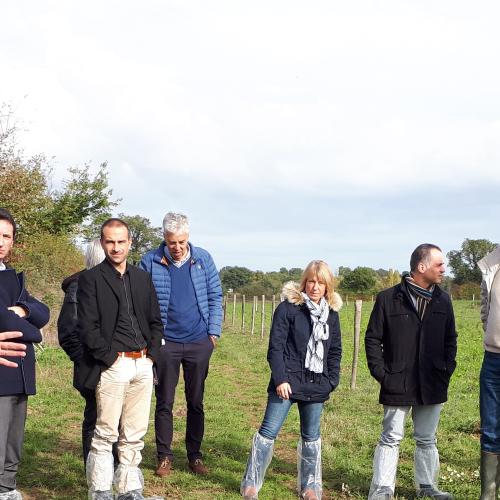The Nouvelle-Aquitaine Poitiers centre's partnerships

Research partnerships
INRAE has several research programmes where the institute's researchers work in collaboration with teams from other public agencies, local authorities, Europe, the French government, professionals, cooperatives, or associations. Most of these programmes are funded by various public and private entities and are managed by the institute in the form of research contracts or service agreements.
Our research centre coordinates two international/European projects: Genial to genotype Australian alfalfa populations, and Eucleg aimed at developing the cultivation of legumes to reduce Europe's dependence on imported plant protein.
Lastly, we actively contribute to higher education, with the coordination and management of the sustainable agriculture modules of the Plants & Society option as part of the Master's programme in Biodiversity, Ecology and Evolution of the Universities of Poitiers and Tours.
Our academic partners
Territorial partnerships
Our centre is a member of the Nouvelle-Aquitaine network for agriculture and innovation (RAIN). This network aims to guide and prioritise innovation programmes and optimise and mobilise resources. Its partners include the Regional Chamber of Agriculture, the Nouvelle-Aquitaine network of Chambers of Agriculture, research and higher education institutions (INRAE, Bordeaux Sciences Agro), technical institutes represented by ACTA and ACTIA, the Agri Sud-Ouest innovation competitiveness cluster, Ovalie Innovation (an R&D company at the service of cooperatives), structures that support and promote innovation such as Agrinove and ADI-NA, the French State through the Regional Directorate for Food, Agriculture and Forestry (DRAAF), and the Nouvelle-Aquitaine Region.
RAIN's other objectives include the annual organisation of Regional meetings for research, development and training (3RDF) to contribute to territorial debates, discussions and actions. These meetings are an opportunity for agricultural researchers, technicians and advisors, biodiversity & environmental advisors, farmers, teachers, students, etc. to share their knowledge and discuss a range of topics including robotics, cover crops, biocontrol, self-sufficiency, water, and soil.
Our territorial partners
Agricultural and economic partnerships
In line with the agricultural orientation of our work, we have established major partnerships with networks of farmers, development stakeholders (Regional Chamber of Agriculture, CIVAM, Bio Nouvelle-Aquitaine) and professional sectors. Our relations with the goat sector are particularly strong as part of the Rexcap network, especially with its Redcap component which supplements our Patuchev scheme. This dynamic has been reinforced by the joint creation, with the French Livestock Institute, of the Joint Technology Unit (UMT) on Sustainable goat farming systems of the future.
Our work is exploited as part of partnerships with SMEs and agricultural cooperatives.
In the seed industry, we host two platforms (one with AgriObtentions and the other with the seed producer Cérience) that utilise our work for the improvement of plants. These partnerships have enabled around 15 varieties of grasses and legumes to be included in the French Catalogue of cultivated plants. In the turf sector, we carry out research in partnership with Soreve and Turf Lab to understand how the environment affects the growth and health of lawns.
In the area of goat reproduction, our historical partnerships with Capgènes (a goat breeding organisation and company) and Evolution XY (an insemination company) aim to strengthen the control of reproduction and the dissemination of genetic progress relating to goats. The innovative methods developed are directly disseminated by SMEs and agricultural cooperatives in France and Europe.
Public expertise
INRAE is the primary member of the Variety and Seed Study and Control Group (GEVES), a public-interest group that assesses and characterises new plant varieties. It conducts the studies needed to include varieties in the Official Catalogue, protect new varieties of plants, and certify seeds. Work is undertaken in close collaboration with the International Union for the Protection of New Varieties of Plants (UPOV) and the International Seed Testing Association (ISTA). On the Magneraud site, our centre hosts two GEVES units that conduct studies focusing on annual crops:
On our Lusignan site, a GEVES team integrated into the FERLUS experimental unit carries out studies on forage species.
Jointly, several of the centre’s researchers are experts in the Permanent Technical Committee for Plant Breeding (CTPS), which examines GEVES's work with a view to including varieties in the French Catalogue.
Researchers and engineers from the centre are members or even chairs of the Expert Committees and Working Groups of the French Agency for Food, Environmental and Occupational Health & Safety (ANSES).
Our partnerships: key figures (2021)
- One CNRS/INRAE contracted unit
- Nine projects supported by the CASDAR fund of the French Ministry of Agriculture and Food
- Six projects supported by the French National Research Agency
- Eight European research projects
